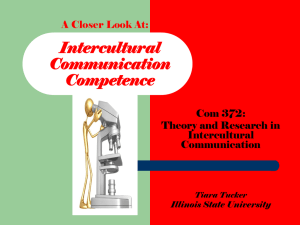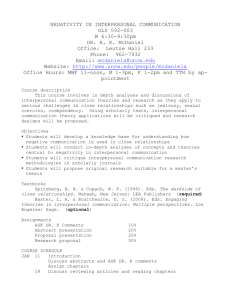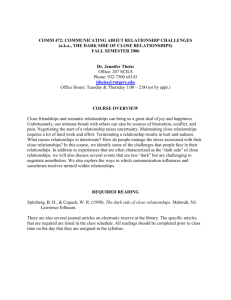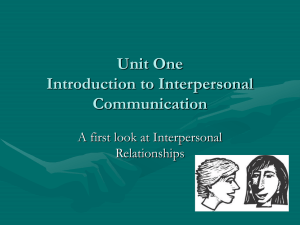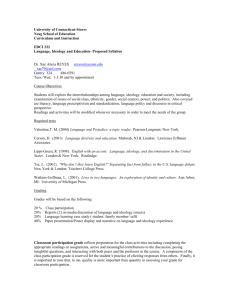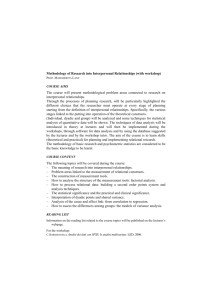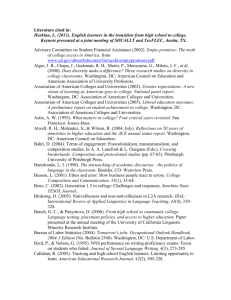syllabusGRADipc08
advertisement
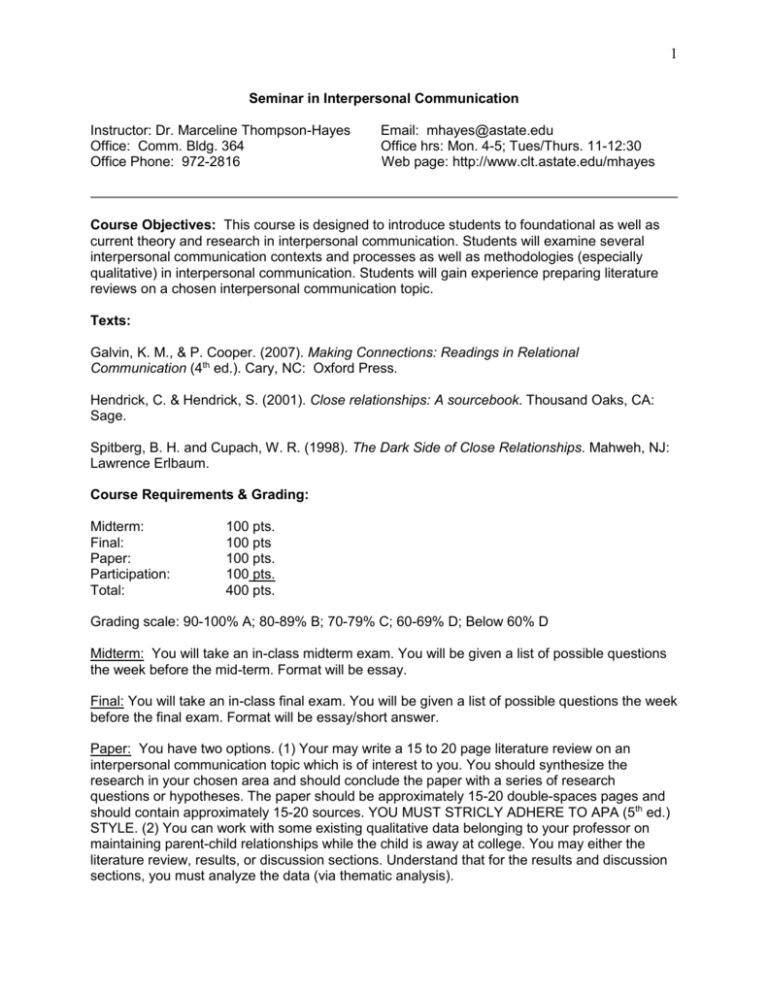
1 Seminar in Interpersonal Communication Instructor: Dr. Marceline Thompson-Hayes Office: Comm. Bldg. 364 Office Phone: 972-2816 Email: mhayes@astate.edu Office hrs: Mon. 4-5; Tues/Thurs. 11-12:30 Web page: http://www.clt.astate.edu/mhayes Course Objectives: This course is designed to introduce students to foundational as well as current theory and research in interpersonal communication. Students will examine several interpersonal communication contexts and processes as well as methodologies (especially qualitative) in interpersonal communication. Students will gain experience preparing literature reviews on a chosen interpersonal communication topic. Texts: Galvin, K. M., & P. Cooper. (2007). Making Connections: Readings in Relational Communication (4th ed.). Cary, NC: Oxford Press. Hendrick, C. & Hendrick, S. (2001). Close relationships: A sourcebook. Thousand Oaks, CA: Sage. Spitberg, B. H. and Cupach, W. R. (1998). The Dark Side of Close Relationships. Mahweh, NJ: Lawrence Erlbaum. Course Requirements & Grading: Midterm: Final: Paper: Participation: Total: 100 pts. 100 pts 100 pts. 100 pts. 400 pts. Grading scale: 90-100% A; 80-89% B; 70-79% C; 60-69% D; Below 60% D Midterm: You will take an in-class midterm exam. You will be given a list of possible questions the week before the mid-term. Format will be essay. Final: You will take an in-class final exam. You will be given a list of possible questions the week before the final exam. Format will be essay/short answer. Paper: You have two options. (1) Your may write a 15 to 20 page literature review on an interpersonal communication topic which is of interest to you. You should synthesize the research in your chosen area and should conclude the paper with a series of research questions or hypotheses. The paper should be approximately 15-20 double-spaces pages and should contain approximately 15-20 sources. YOU MUST STRICLY ADHERE TO APA (5th ed.) STYLE. (2) You can work with some existing qualitative data belonging to your professor on maintaining parent-child relationships while the child is away at college. You may either the literature review, results, or discussion sections. Understand that for the results and discussion sections, you must analyze the data (via thematic analysis). 2 You should meet with me as you experience problems. Feel free to turn in early drafts, but be prepared for feedback and suggestions. Papers will be presented in class. Participation: In typical seminar format, this course will depend heavily upon class discussion. As such, you will be assigned particular readings to present. You must provide a DETAILED, FULL-SENTENCE outline to the class on the day you are scheduled to present. In addition, you will be expected to generate class discussion regarding the reading you are presenting. Regardless of whether or not you are presenting on a given day, you should have a “voice” in this class. Always be respectful of other students. Attendance: The expectation in graduate school is that you will attend ALL classes. In order to stress this point, your final grad will be reduced by one letter grade beyond the first absence. Tentative Schedule of Topics: Week One Introduction to the course: Types and Contexts of Interpersonal Communication Jan. 14 Week Two Off Jan. 21 Week Three Jan. 28 Introduction to Relational Communication Berger, C. (2005). Interpersonal communication: Theoretical perspectives, future prospects. Journal of Communication, 55, 415-447. Wilmot, W. (1996). The relational perspective. In. K. M. Gavin & P. Cooper (Eds.), Making Connections: Readings in Relational Communication (pp. 16-24). Los Angeles, CA: Roxbury Press. Week Four Feb. 4 Marriage and Family: Families Pawlowski, D. R., Thilborger, C., & Cieloha-Meekins, J. (2001). Prisons, old cars, Christmas trees: A metaphoric analysis of familial communication. Communication Studies, 52, 180-196. Stafford, L., & Dainton, M. (1994). The dark side of normal family interaction. In W. R. Cupach & B. H. Spitzberg (Eds.), The Dark Side of Interpersonal Communication (pp. 259-280). Hillsdale, NJ: Lawrence Erlbaum. Week Five Feb. 11 Marriage and Family: Siblings Barr, J., McLeod, S., & Daniel, G. (2008). Siblings of children with speech impairment: Cavalry on the hill. Language, Speech, and Hearing Services in Schools, 39, 21-32. 3 Myers, S. A. (1999). Perceived sibling use of relational communication messages and sibling satisfaction, liking, and loving. Communication Research Reports, 16, 339-352. Week Six Feb. 18 Marriage and Family: Spouses Bergen, K. M., Kirby, E., McBride, C. M. (2007). How do you get two houses cleaned? Accomplishing family caregiving in commuter marriages. Journal of Family Communication, 7, 287-307. Olson, L. N. (2003). From lace teddies to flannel PJ’s: An analysis of males’ experience and expression of love. Qualitative Research Reports in Communication, 4, 38-44. Week Seven Feb. 25 Wood, J. (2000). “That wasn’t the real him:” Women’s dissociation of violence from the men who enact it. Qualitative research reports in communication, 1, 1-7. White, C. H. (2004). Welsh widows’ descriptions of their relationships: Themes of relational experience in long-term marriage. Communication Studies, 55, 1-13. Week Eight Mar. 3 EXAM 1 Week Nine Mar. 10 Romantic Relationships and Passion Goldsmith, D. (1990). A dialectic perspective on the expression of autonomy and connection in romantic relationships. Western Journal of Speech Communication, 54, 537-556. Sinha, G. (2002, October). You dirty vole. Popular Science, 261, 84-89. http://www.popsci.com/popsci/printerfriendly/science/1e05359b9fa84010vgnvcm1000004eecbc cdrcrd.html Wood, A. M. (2003). ‘You should get yourself a boyfriend’ but ‘let’s not get serious’: Communicating a code of romance in a retirement community. Qualitative Research Reports in Communication, 4, 31-37. Week Ten Mar. 17-22 Week Eleven Mar. 24 Spring Break Romantic relationships and Passion cont. Bratslavsky, E., Baumeister, R. F., & Sommer, K. L. (1998). To love or be loved in vain: The trials and tribulations of unrequited love. In B. H. Spitzberg & W. R. Cupach (Eds.), The Dark Side of Close Relationships (pp. 307326). Mahwah, NJ: Lawrence Erlbaum. 4 Felmlee, D. H. (1998). Fatal attraction. In B. H. Spitzberg & W. R. Cupach (Eds.), The Dark Side of Close Relationships (pp. 3-31). Mahwah, NJ: Lawrence Erlbaum. Week Twelve March 31 Friendships Fehr, B. (2000). The lifecycle of friendship. In. C. Hendrick & S. S. Hendrick (Eds.), Close Relationships: A sourcebook (pp. 71-82). Thousand Oaks, CA: Sage. Fine, G. A. (1996). Friendships in the workplace. In K. M. Galvin & P. Cooper (Eds.), Making Connections: Readings in Relational Communication (pp. 270-277). Los Angeles, CA: Roxbury Press. Stewart, L, Cooper, P., Stewart, A., & Friedley, S. (1996). Communication in cross-gender friendships. In K. M. Galvin & P. Cooper (Eds.), Making Connections: Readings in Relational Communication (pp. 261-267). Los Angeles, CA: Roxbury Press. Week Thirteen April 7 Professional Relationships Buell, C. (2004). Models of mentoring in communication. Communication Education, 53, 56-73. Price, L. L., Arnould, E. J. (1999). Commercial friendships: Service provider-client relationship I context. Journal of Marketing, 63, 38-56. Week Fourteen April 14 The Dark Side of Close Relationships Segrin, C. (1998.) Disrupted interpersonal relationships and mental health problems. In B. H. Spitzberg & W. R. Cupach (Eds.), The Dark Side of Close Relationships (pp. 327-365). Mahweh, NJ: Lawrence Erlbaum. Kirn, W. (2002, September 16). I’m O.K. You’re O.K. We’re Not O. K. Time, 92. http://www.time.com/time/magazine/article/0,9171,1101020916-349086,00.html Week Fifteen April 21 Dark Side cont. Guerro, L. K. & Andersen, P. A. (1998). The dark side of jealousy and envy: Desire, delusion, desperation, and destructive communication. In B. H. Spitzberg & W. R. Cupach (Eds.), The Dark Side of Close Relationships (pp. 33-70). Mahweh, NJ: Lawrence Erlbaum. Sillars, A. L. (1998). Misunderstanding. In B. H. Spitzberg & W. R. Cupach (Eds.), The Dark Side of Close Relationships (pp. 73-102). Mahweh, NJ: Lawrence Erlbaum. 5 WeekSixteen April 28 Dark Side cont. Messman, S. J. & Canary, D. J. (1998). Patterns of conflict in personal relationships. In B. H. Spitzberg & W. R. Cupach (Eds.), The Dark Side of Close Relationships (pp. 121-152). Mahweh, NJ: Lawrence Erlbaum. Weber, A. L. (1998). Losing, leaving, and letting go: Coping with nonmarital breakups. In B. H. Spitzberg & W. R. Cupach (Eds.), The Dark Side of Close Relationships (pp. 267-306). Mahweh, NJ: Lawrence Erlbaum. Week Sixteen FINAL EXAM See exam schedule for date and time
